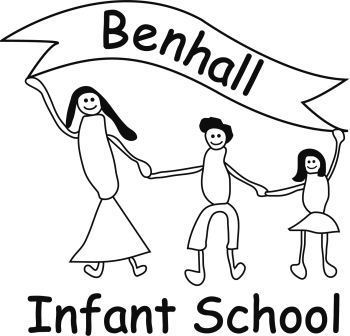Speaking and Listening at Benhall
At Benhall Infant School we believe that play and language development go together like macaroni and cheese, so we ensure that all our learning environments are communication rich and that our higher than average staff to pupil ratios promote the opportunity for children to become fluent talkers and attentive listeners.
It is crucial for children to have access to quality adult-child interactions that focus on following the child’s lead in their learning. Effective communication consists of attention development where children learn to orientate their attention, then focus their attention, then disconnect their attention to be able to switch their focus and finally to integrate their attention enabling them to attend to more than one thing at once and Language Development where children learn the oral motor control to make sounds and blend sounds to create words. Exposing children to tiered vocabulary structures across all subjects ensures that all learners are exposed to ambitious vocabulary and begin to grow their own banks of vocabulary by revisiting and refining what they have already learned and understood. Language comprehension (necessary for both reading and writing) starts from birth. It only develops when adults talk with children about the world around them and the books (stories and non-fiction) they read with them, and enjoy rhymes, poems, and songs together.
Key features of effective communication skills
Features of effective teaching of communication skills have been identified as those that define effective early years practise.
These are:
- Following the child’s lead
- Providing language models for children to copy
- Modelling and explaining the meaning of new vocabulary
- Having high expectations for all
- Providing communication rich environments
- Having a total communication approach
How we teach speaking and listening
- In Pre-School, children are introduced to communicating in small groups which promotes their attention development and their confidence in speaking in a group. Story times, learning rhymes and the welcome at the start of each session promote these skills. Adults provide language models and introduce new vocabulary effectively by responding to the children’s play and interests.
- In reception and KS1, children continue to develop their communication skills through small group discussions, partner talk and class meetings. As the children progress through school there are increasing opportunities for the children to work collaboratively with their peers or younger pupils. The older children are excellent role models and advocates for our school. They enjoy opportunities to discuss their learning with each other, their teachers and visitors.
- The development of speaking and listening skills is closely linked to our performance curriculum and children are encouraged to take part in whole school productions at Christmas and our year 2 leavers delight everyone with their final leavers production at the end of KS1
- Further opportunities to develop vital speaking and listening skills come through enrichment activities such as school council, eco warriors, class meetings, taking visitors on a tour of their classroom/school, participating in assemblies and becoming playground buddies.
The child’s progression as a communicator
At Pre-school, I am a mini communicator where I talk. I enjoy listening to stories and can talk about what I remember. I love to try out new words when I am playing or talking to familiar adults. I am interested in using words and phrases for effect and will mirror what I have heard.
I am able to:
- Listen for longer
- Pay attention to one thing at a time but find it difficult to pay attention to more than one thing at a time
- Respond to questions and /or instructions
- Learn new vocabulary
- Use longer sentences
- Tell you my point of view
- Start a conversation
- Engage in rhyme and or story times
In reception, I am an early communicator who loves to chat with my friends and familiar adults. I enjoy listening to others and listen to a variety of people during my day. I understand the importance of listening carefully and I am inspired by what I hear. I speak in well-formed and fluent sentences. I immerse myself in language rich environments which enable me to access new and exciting vocabulary. Through reading, story telling, role play and my own experiences I am confident to use a range of ambitious vocabulary and language structures that have been modelled by the adults around me.
I am able to:
- Apply what I have heard in my learning
- Listen carefully
- Learn new vocabulary
- Engage in book talk (fiction and non-fiction)
- Ask questions
- Retell familiar stories
- Learn rhymes, poems and songs
- Use new vocabulary in different contexts
- Articulate my ideas
- Connect my ideas
- Describe events in detail
- Use talk to help work out problems
- Use social phrases
In KS1, am communicator who loves to discuss my experiences. I speak with confidence in a range of contexts about the things that I am interested in or that are important to me. I understand the importance of listening carefully to show respect for the speaker as well as to promote my own understanding. I am prepared to speak in front of familiar audiences and enjoy the element of debate during our class meetings.
I am able to:
- Retain information I heard from a range of sources
- Listen to the details
- Learn increasingly ambitious vocabulary and discuss its meaning
- Engage in book talk and share my opinions
- Ask appropriate questions
- Sequence my ideas, recollections when speaking
- Respectfully share my point of view
- Use my tone of voice to engage the listener
- Hold collaborative conversations over longer periods
